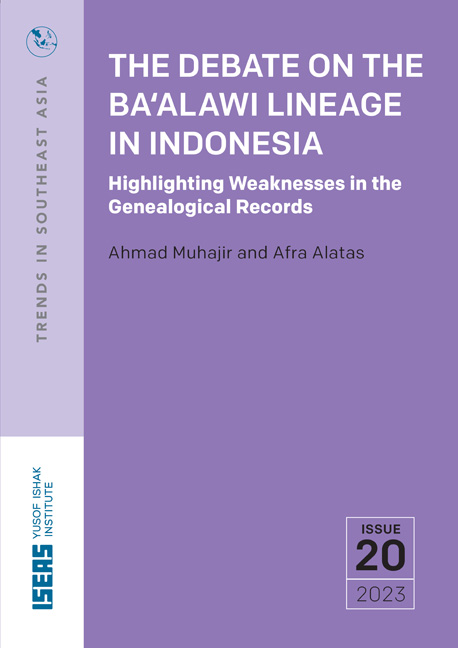The Debate on the Ba‘Alawi Lineage in Indonesia: Highlighting Weaknesses in the Genealogical Records
Published online by Cambridge University Press: 13 April 2024
Summary
EXECUTIVE SUMMARY
• A scholar from Nahdlatul Ulama by the name of Imaduddin Utsman has recently challenged the long-accepted claim that the Ba‘Alawi—Muslims of Hadhrami descent also known in Indonesia as habaib—are descendants of Prophet Muhammad. The challenge arose out of his critical examination of available records on the Prophet's lineage from the fifth century to the tenth century of Islam.
• His unprecedented challenge courted controversy in Indonesia. It was even more surprising that it came from a religious scholar with a traditionalist background.
• The debate that ensued was inevitable as the habaib community had to defend their ancestry, and joining them in their defence were some Javanese Muslim scholars. However, Imaduddin actively rebutted their responses, alongside several other like-minded non-Arab scholars.
• This article examines the debate where both sides presented documents and theories about the (dis)connection of the Ba‘Alawi lineage to Prophet Muhammad. We argue that while Imaduddin's research does not fully invalidate the Ba‘Alawi lineage, the habaib have not been entirely convincing—from Imaduddin's perspective—about their genealogy.
• Nevertheless, the authority of the habaib remains intact despite the challenge to their lineage. This is because they can derive their authority from other factors apart from their lineage.
- Type
- Chapter
- Information
- The Debate on the Ba'Alawi Lineage in IndonesiaHighlighting Weaknesses in the Genealogical Records, pp. vii - viiiPublisher: ISEAS–Yusof Ishak InstitutePrint publication year: 2023



